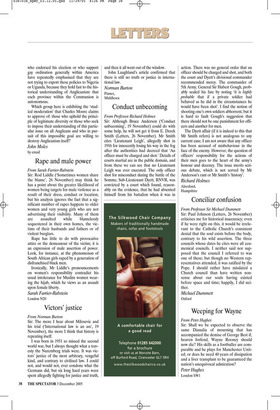Conduct unbecoming
From Professor Richard Holmes
Sir: Although Bruce Anderson (‘Conduct unbecoming’, 19 November) could do with some help, he will not get it from E. Derek Smith (Letters, 26 November). Mr Smith cites ‘Lieutenant Leigh’, allegedly shot in 1916 for innocently losing his way in the fog after the authorities had decreed that ‘An officer must be charged and shot.’ Details of courts martial are in the public domain, and from these we can see that no Lieutenant Leigh was ever executed. The only officer shot for misconduct during the battle of the Somme, Sub-Lieutenant Dyett, RNVR, was convicted by a court which found, reasonably on the evidence, that he had absented himself from his battalion when it was in action. There was no general order that an officer should be charged and shot, and both the court and Dyett’s divisional commander recommended mercy. The commander of 5th Army, General Sir Hubert Gough, probably sealed his fate by noting ‘it is highly probable that if a private soldier had behaved as he did in the circumstances he would have been shot’. I find the notion of shooting one’s own soldiers abhorrent, but it is hard to fault Gough’s suggestion that there should not be one punishment for officers and another for men.
The Dyett affair (if it is indeed to this that Mr Smith refers) is not analogous to any current case; I am not aware that any officer has been accused of misbehaviour in the face of the enemy. However, the question of officers’ responsibility for the actions of their men goes to the heart of the army’s honour and decency. The issue merits serious debate, which is not served by Mr Anderson’s rant or Mr Smith’s ‘history’.
Richard Holmes Alresford, Hampshire



























































 Previous page
Previous page